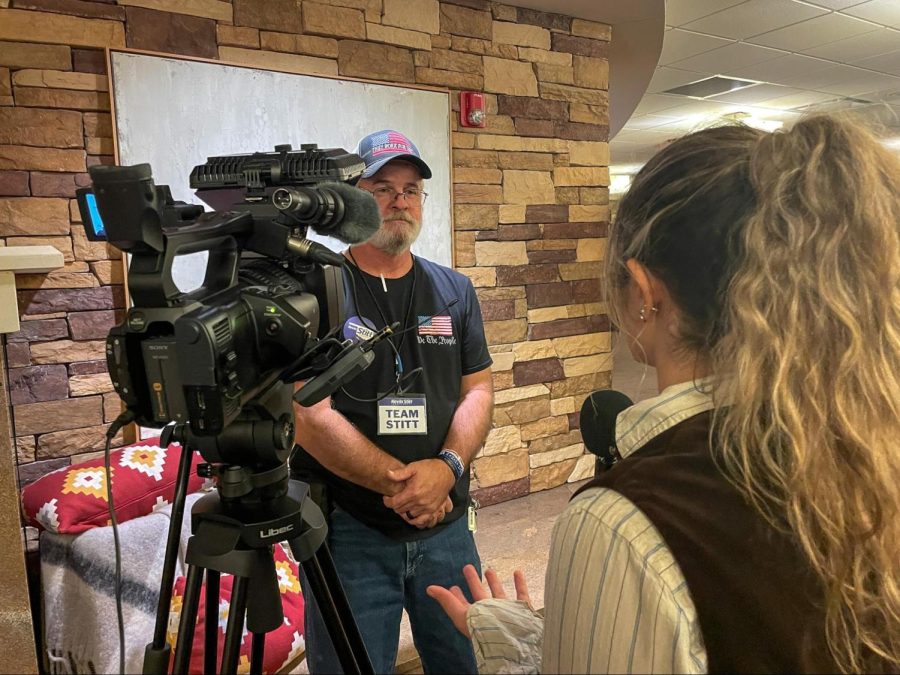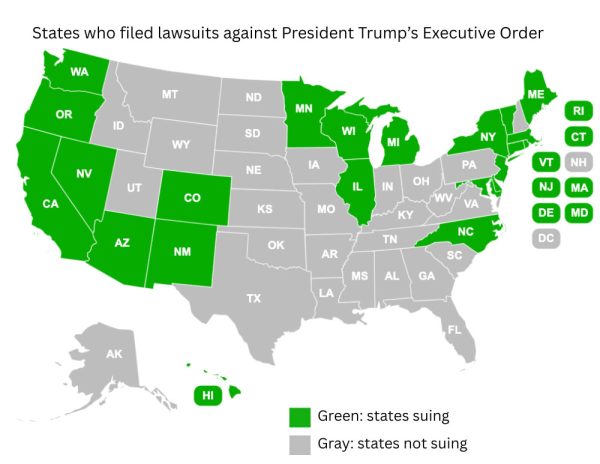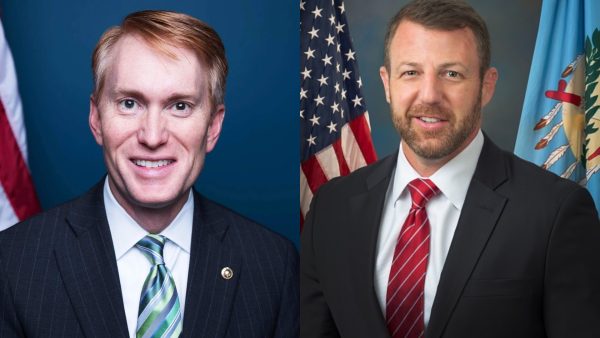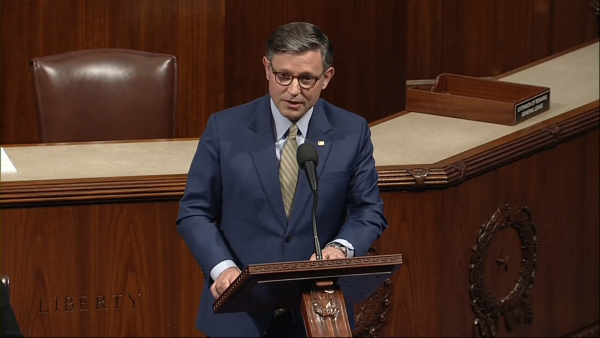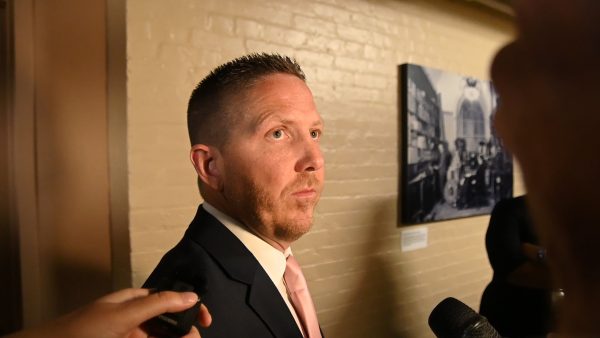Stitt’s reelection hopes uncertain in dead heat Oklahoma governor’s race
Despite Oklahoma’s notoriously red history, Gov. Kevin Stitt’s bid for reelection is facing pushback from Oklahoma voters as Democrat Joy Hofmeister narrows the gap in the polls.
In the 2020 general election, Oklahoma was the only state to have all red counties, with about 65% of voters leaning Republican and only 32% voting blue.
But this year, Hofmeister, a former Republican and current Oklahoma Superintendent of Public Instruction, has managed to keep pace with the incumbent governor. And the endorsement of Hofmeister last week by former Republican Congressman J.C. Watts turned up the heat on an already overheated race.
Watts, a self-described “devoted conservative” and former U.S. Congressman, announced his support for Hofmeister via an ad shared on Twitter that is now airing on television statewide.
“I was a Republican then, and I’m a Republican now,” Watts said. “And friends I’m voting for Joy Hofmeister.”
Recent polls have indicated uncertainty surrounding the gubernatorial race. On Oct. 31, Ascend Action, an Oklahoma-based polling organization, showed Hofmeister with a 3% lead over Stitt, with a 48% to 45% ratio. But on Nov. 4, Emerson College found that 49% of voters favored Stitt, with Hofmeister polling only 40%.
Tyler Johnson, a University of Oklahoma associate professor of political science, said the back-and-forth nature of the race can be attributed to polling difficulties in Oklahoma.
“This is a state that has not been very competitive in the last few cycles, so I think that local companies and national companies are coming in and trying to get a few for this race and I don’t necessarily think they have a great grasp on who’s likely to vote here given past histories,” Johnson said.
Despite the competitive nature of Stitt’s bid for reelection, other Republican candidates have not faced such struggles. Emerson College and Ascend Action polls reveal that U.S. Sen. James Lankford (R-OK) and U.S. Rep. Markwayne Mullin (R-OK 2nd District) have maintained double-digit leads over their Democratic opponents.
“This is still a pretty conservative state, but this is a governor who has not been the most popular within his own party necessarily,” Taylor said. “He’s made some enemies in the state legislature, and more broadly he’s made some enemies with the tribes and tribal leaders in this state and there have been some questions of corruption.”
Stitt has continually upset the tribal nations throughout his term as governor. A significant point of contention began when the U.S. Supreme Court reaffirmed tribal sovereignty in the 2020 McGirt decision. The court’s vote upheld the Muscogee (Creek) nation’s treaty rights, which guaranteed the tribal nation concurrent jurisdiction with the federal government over its land, eliminating the state’s criminal jurisdiction over half of the state and all members of the Muscogee nation.
Stitt openly condemned the ruling, saying McGirt has been “destructive” and has “hamstrung law enforcement.”
The state filed more than 30 petitions, 29 of which were dismissed, seeking to overturn the McGirt decision, including 2021’s Oklahoma v. Castro-Huerta. That case sought to narrow the power of the McGirt ruling. In a 5-4 decision, the Supreme Court upheld the state has concurrent jurisdiction with the federal government in cases involving non-Natives who committed crimes on tribal land against Natives.
Tempers flared between Stitt and the tribes, with Cherokee Nation Principal Chief Chuck Hoskin Jr. criticizing the state’s continued efforts to reverse McGirt and calling Stitt “the most anti-Indian governor in the history of Oklahoma.”
Stitt has been accused of using the Castro v. Huerta ruling “like a magic wand,” attempting to use the decision to dismiss a 2020 lawsuit filed by Citizen Potawatomi Nation, Cherokee Nation, Choctaw Nation and Chickasaw Nation over gaming compacts.
Stitt made controversial compacts with the Otoe-Missouria Tribe, Comanche Nation, United Keetoowah Band of the Cherokees and Kialegee Tribal Town in an attempt to “…leave behind the one-size-fits-all approach to the model gaming compacts,” according to Stitt. Before this announcement, other Oklahoma tribes believed that the long-standing Model Gaming Contract had been renewed, a position Stitt opposed.
The lawsuit has been up in the air since 2020, with the Oklahoma Supreme Court ruling that Stitt’s new compacts were invalid. However, in early October, Stitt’s legal counsel filed to dismiss the tribes’ lawsuit and redefine the 2020 gaming compacts as valid under Castro v. Huerta.
With increasing worry over the strength of tribal authority and the upcoming Supreme Court decision on the Indian Child Welfare Act, on Oct. 11, the Five Tribes (Cherokee, Chickasaw, Muscogee, Choctaw and Seminole nations) announced their support for Joy Hofmeister. The tribes noted her willingness to work with them and her “respect for tribal authority.”
Charles Finocchiaro, associate director of the Carl Albert Congressional Research & Studies Center, said the closeness of the race can be attributed to many factors, citing the push Hofmeister has caused by rallying otherwise solidly Republican groups.
“I think there are Republicans who are open to saying, ‘in this election, I might vote for a Democrat,’” Finocchiaro said.
He also pointed to the support Hofmeister is receiving from rural counties in Oklahoma over education issues.
“The way in which the governor’s vouchers plan has been discussed looks as it could fall particularly hard on rural school districts,” said Finocchiaro, “So, I think that makes rural areas that would usually be pretty safe red territory open for Hofemister to do better than a Democrat might ordinarily.”
Hofmeister has called the governor’s voucher plan a scheme and a “rural school killer” and has focused her campaign in rural areas where private schools do not exist or are not an option for families. Stitt has similarly tied himself to the issue but has focused on the importance of “school choice” and claimed that creating these vouchers would lead to more private schools being established in rural counties.
SB1647 was authored by Senate Pro Tem Greg Treat, R-Oklahoma City, and would allow state dollars to go to students to spend on private school tuition and other education expenses instead of public school. The bill passed in senate committee and is eligible to be heard on the floor.
The Oklahoma State School Boards Association has openly opposed the idea of private school vouchers. The association has called the vouchers “troublesome” and harmful to children in the Oklahoma public schools system.
The OSSBA has claimed that Oklahoma already underfunds its public schools and that instituting the dual-education program would further erode the system and hinder the 700,000 children who attend the schools. The association also noted concerns over the requirement for any student who accepts the vouchers to forfeit their access to specialized services to meet their individual special needs.
Finocchiaro also noted the “political moment” created by the Dobbs decision, its possible impact, and Stitt’s aggressive anti-abortion policies.
“I think it has energized the Republican base in certain ways that have also energized the Democratic base,” Finocchiaro said.
Finocchiaro said Hofmeister has been able to attract moderate voters on abortion issues by tiptoeing around the subject while stating her belief in the right to medical privacy.
Hofmeister’s website states that she is against “extremes on either side of abortion access” and believes it is “a healthcare decision between a woman and her doctor.”
Pew Research found that 51% of adult Oklahomans support abortion in all cases, while 61% of adult Americans believe abortion should be legal in all cases.
“The American public as a whole is relatively moderate on a lot of things, and one of those is abortion,” said Finocchiaro, “A candidate who is kind of playing up that sort of theme and that sort of a focus, I think, has some appeal.”
Gaylord News is a reporting project of the University of Oklahoma Gaylord College of Journalism and Mass Communication. For more stories by Gaylord News go to GaylordNews.net.

